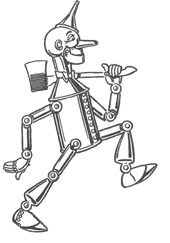
Job-Search
Secrets

"Choose a job you love, and you will never have to work a day in your life."
- Confucius


I. ALWAYS ASK for the JOB DESCRIPTION!
Why?
1. Because it lists the Specific DUTIES...
... that whoever is hired for that position will be doing on a daily basis.


It's like a getting a blueprint or a snapshot of "the Person" they have in mind - THE person that they're looking for... And now that you know more about "who" they want, you know better how to present (or market) yourself to them, in order to "BE" that person.
TRY THIS:
START at their Job Description, and then "Reverse Engineer".
Simply take the skills, experience, knowledge or education that you find on their Job Description that describes YOU, and then bring them over to your Application or Resume...
"Tell 'em what they want to hear ,"
(based on who you are, what you know, or what you've done).
- Use any exact, matching or similar skills or experience from their Job Description list...
- Then PLEASE Throw Out Anything and Everything Else... (because the Employer frankly doesn't care - and it's a waste of THEIR valuable Time)!
REMEMBER...
Your tiny WINDOW of OPPORTUNITY lasts ONLY 10 to 30 SECONDS!

That's the statistically average amount of time Employers actually spend doing a fly-by through your Resume or Application!
To Top of Page

II. Avoid ALL Negatives (as Much as Possible)
Don't give them a reason to "Screen you OUT"
If asked to disclose negatives, DO NOT give details!
... Instead, simply state "Will discuss at Interview".
Timing is all-important when dealing with ANY negatives! So try to save ANY Negatives for the Interview - IF at all possible...
If you give them a reason to, they WILL "screen-you-OUT"... and you know as well as me that "no interview = no job".
Consider:
- How much of communication does WRITING actually convey?
- You have probably heard of studies where "WRITING" is rated as only being only a small part (20%-35%) of Communication.
Why is this? Writing does NOT let you fully explain, or allow you to answer or respond to any questions.
Writing is impersonal - It is very EASY to reject a "piece of paper".
Writing misses out completely on important parts of communication like: eye-contact, smiling, feelings; vocal volume and pitch; your "attitude" or demeanor, your personality and people-skills, etc.
With very few exceptions, WRITING ANYTHING NEGATIVE, other than a simple "Will discuss at Interview" where the application says; "If YES, please explain" Will BLOW YOUR CHANCES of getting invited to come in for an Interview...

An Example:
If I were leading a seminar or teaching a class ... at this point I would begin filling up the overhead or the chalkboard with lots of "(+)" marks, (and only one "(-)" mark), while saying:
..."A Job Application or Resume is like a first date.
Everyone looks good, smells good, acts good, dresses up nice, and is on their very best behavior.
But what are they like six months later? Or Six YEARS later?"
It's the SAME THING when dealing with Prospective Employers... "Everything is positive, and you're sure that employers will LOVE all those positive things you told them!
It's ALL good, right? Does anything stand out?
Do you see it? (I point to the ONE Negative on the chalkboard)...
...That's right! That ONE lone negative stands out like a sore thumb."

You might say, "Well, but I've got 30 positives and only ONE negative!" Okay. But the Employer will most likely call up someone else who either does NOT have, (or is not disclosing) any negatives, and they will NOT get around to calling you. This is usually true even if the other applicant has less skills and experience than what you have to offer.
You may be thinking that all of the good stuff will outweigh the bad, (there were only one or two small, negative things)... Doesn't that make sense? NO, Absolutely and Positively NOT! In any other situation, maybe... but NOT in the Job-Applying-stage of the Employment process!

What usually happens is that when Employers hear any "negatives", they get spooked. They've had too many employee problems already, and unfortunately as a result of what they see as your "negative" they suspect you as another potential problem.
Honestly, who wants to hire problems? Fair or not, this is the "impression" you'll make by self-disclosing potential negatives in the early stages of the Employment Game.
If you are expecting employers to give you a job, you MUST help them to hire you! Don't eliminate yourself from the running by "telling them what they DON'T want to hear". Remember, in reality you are marketing yourself! Who wants to buy a product that already has problems?
Dreaming that Employers will simply overlook your negatives and hire you anyway reminds me of the chapter in the Wizard of Oz where Dorothy was tapping her shoes together three times...
...So maybe when looking for work, YOU could do this and repeat 3 times; "The negatives won't matter, the negatives won't matter, the negatives won't matter..."

A LIST OF LIKELY "PERCEIVED" NEGATIVES
Fired from a Job
Felony (Criminal Background or History)
Injury (Especially On-the-Job)
Job "Gaps" between Jobs
No Work Experience
Too Much Experience (= "Overqualified")
Too "Young"
Too "Old"
Too Many Short-term Jobs
New to the Area
No Verifiable Work References
Bad References
Be Prepared - Preparation is Everything
Prepare ahead of time How-to present any negative(s) you may have.
Practice saying ALL things in the most positive way possible, and ALWAYS BE POSITIVE during your actual Job Interviews.
Take a lesson from Bill Clinton. Regardless of your political or ethical persuasions, you must admit that he was the consummate "Jedi-Master of Spin". No matter what situations or problems came up, he was able to present every negative in the most positive light possible. Now, you go and do the same.
Timing is VERY important here. Be sure to plan not only WHAT to say, but also WHEN to say it - if you are given the choice.

REMEMBER...
You don't have to "play all your cards", or disclose everything, in your past, do you?
Now, there ARE some things that you MUST legally let employers know, and there are also things that they may learn about you while verifying your previous Employment, or in the process of doing credit or background checks...
It is highly recommended that you tell ONLY the truth about your experience and skills. However, this does not mean that you must tell them EVERYTHING! You simply CANNOT! There is not enough time or enough space to write it all down, and some of the information is irrelevant to the Job for which you are Applying or Interviewing.
So... Do NOT "clutter-up" your application materials (Application, Cover Letter, Resume, etc.) by including unrelated details. Don't waste the Employers' time - or your opportunity...
Keep in mind that you are marketing yourself, and that only 2% to 5% of Job Applicants EVER get asked to come in for an Interview.
Lastly, be sure that you keep yourself within the realm of your own personal honesty and integrity, so that you can sleep well at night, with a clear conscience.

Be Brief - Get in, and Get OUT!
Skip across the surface of any "negatives" that come up, like a skipping stone skimming across a pond.
Offer just enough information to help them choose to hire you. Never mention even one negative word about a former employer, supervisor or co-worker, or they will imagine you saying the same things about them. Lastly, don't ever get sucked into giving them "all the gory details", or you will indeed sink like a rock!
Explain WHY the negative is no longer a problem. Tell them WHAT you learned, and HOW you're a better worker (or better person) as a result. Everybody faces difficulties in life, and everyone makes mistakes. What really matters is how you deal with those problems.
If you honestly present your "negative" in the best possible light, and also avoid saying anything "bad" about others, you will give yourself a very good shot at the job.

- A real-life example may help to illustrate:
Let's say you were Injured-on-the-job, or filed a Workman's Compensation (loss of work time) claim with a previous Employer. When you filled out the company Job Application, you came to what I call "the Uglies" section - all of those "Have you ever...?" questions. You checked "Yes" on the Injury question box, and wisely put "will discuss at Interview" in the "If Yes, please explain" area....
Amazingly, you now find yourself right where you want to be
- at the Interview!
The Interviewer has at last finished their long line of questioning, and then says something to you like; "Do you have any questions, or is there anything you'd like to add?" You're sitting there thinking, "Wow! They never brought up the on-the-job injury! Boy, did I luck out!"
You seriously consider just letting it slide - and then you remember this article! So you take a deep breath, risk it all and say; "Well, I'm a bit surprised that you didn't bring up any questions about my on-the-job injury. I'd like to explain it to you, if you've got a minute."
Then you tell them the positive explanation (or "spin") regarding what happened. (Do what you've practiced, and back it up with examples or paperwork, if you can ). In this example, you may want to remember to take along a copy of a Doctor's Release or any medical records showing that the issue has been resolved.
You may even go so far as to offer to sign a release of responsibility form prior-to-hire, by which you are generously offering to keep them from being held responsible, should you have an unexpected reoccurrence of your previous injury on the job. Whatever the case, be as brief as possible, and avoid most details so you can get past "the negative" and land the job.

Practice, Practice, Practice!
What will you say? There is NO substitute for advanced preparation. You must explain away all potential problems that the employer is aware of, if you expect to land the job! And to pull it off, you have to practice, practice, practice!
What if the Interviewer were to say "That almost sounds like a speech..." You could respond with something like; "Well, this job is very important to me, and I've spent a lot of time preparing for this Interview..."
- HELP THEM HIRE YOU by being completely honest, and being yourself. But remember, being honest does NOT mean spilling your guts, or self-disclosing any non-essential negative information that may disqualify you from further consideration.
- Also, DON'T GIVE THEM "TOO MUCH INFORMATION". If you EVER hear the word "OVERQUALIFIED", you've told them too much, and you have actually eliminated yourself from being considered for that position. Much better to match what you tell them on your Application or Resume to the specific skills and experience levels listed in their Job Description.
To Top of Page
III. Check ALL References, Former Employers,
and Other Sources:
Find out what potential Employers can find out about YOU!
FOR PREVIOUS EMPLOYERS YOU LIST ON ANY APPLICATION:

- CALL AND ASK:
- What is the Company Policy regarding "Employment Verification"?
- In other words, "What can they say about your salary, your reason for leaving, your work history, your attendance or other details?"
- Ask if you are Eligible to be RE-HIRED at that company?
If NOT, ask why not?

THE "REHIRE" QUESTION
More and more companies are changing their policies regarding re-hiring past Employees.
I worked with one very professional young lady who had excellent experience, wonderful skills, and a great personality, yet had been out of work a long time. After several calls to References and getting glowing reports, I was mystified. Then I started calling her previous Employers. The first Employer listed (which was a short, 3 month "get-by job" in a non-related field) told me that she was NOT eligible to Rehire. Surprised, I asked them "Why?" "That's our company policy". "We don't re-hire ANYBODY", was their reply.
Needless to say, this was news to her! She was baffled by this newfound revelation, especially because when she had left that job her Boss told her that if she ever needed a Job in the future, to contact them right away, and they would try to hire her back! They even gave her a goodbye party when she left!
So I told her to either omit that job entirely (which only works well on a short job assignment like this one), or continue to include it and check the box marked "OK to Contact" for this former Employer, and immediately add this:
"NOTE: Employer Policy NO REHIRE".
That way, if any potential NEW Employer was interested in hiring her, they could inquire from the previous Employer if their Company Policy was "No Rehire", when they said they would not rehire her. This make a HUGE difference to potential NEW Employers, since they are trying to avoid hiring "problem" employees. This puts the problem where it belongs - on the Previous EMPLOYER, not on YOU!


FOR REFERENCES YOU SUPPLY:
- Always ASK if you can "use them". (They are doing you a real favor).
- Former "Bosses" work BEST! (Fancy titles "reflect" like a mirror, making YOU look good!)
- ASK your References how THEY would like to be contacted. They will think you're very considerate, but you want and need them to be easily reached by interested employers.

CHECK YOUR OWN CREDIT RATING :
A simple credit rating check is relatively inexpensive, and you really NEED to perform a current credit check. Why? Because more and more Employers are using the Credit Check as a fast-and-cheap tool to screen YOU out of the running... even when there is NO logical reason (like cash handling) related to doing the Job you're applying for!
Like many other Job Applicants, you may resent this personally invasive procedure of prying into your personal affairs, but the reality is: IF you do NOT pass a Credit Check, it can PREVENT you from getting a growing number of jobs!

So, why not instead find out beforehand what prospective Employers will learn if they do a Credit Check on you? You may THINK you already know, but it may actually turn up different than you think! You can deal with problems or issues that you KNOW, if you know about them...

DO A CRIMINAL BACKGROUND HISTORY CHECK
- ON YOURSELF :

You may say, "But I've never been in trouble with the LAW! Why would I need to do THAT?" Well, you might be surprised by what you DO (or DON'T) find!
All it takes is a simple data-entry error - a clerk just messing up ONE digit - while entering your Social Security Number (SSN), and you may instantly appear to be an Ex-Felon to an Employer!
A Background Check can be a whole lot easier than you think ...
Many County or State Courthouses have request forms, or offer free computer-access for you to see exactly what Employers will find, if they run a Criminal Background History check on you.

WHAT IF YOU HAD GOOD JOB PERFORMANCE, BUT ARE SURE YOU'LL GET A BAD REFERENCE?
- (You had a Personality Conflict,
or a "BAD BOSS")
FIRST, TAKE AN HONEST LOOK AT YOURSELF AND BE SURE YOU ARE NOT THE PROBLEM.
This is easier said than done, but be brave and face yourself. What part did you have in the problem? What might you do differently in a similar situation in the future to bring about better results? Can you accept full "ownership" and personal responsibility for your OWN shortcomings?
Once you've dealt with these questions, and you're still convinced a former Employer is unfairly limiting your ability to find new work, you could carefully consider the following possibility:
(Note: This is ONLY ONE possible course of action and is neither recommended, endorsed nor advised by the Wizard of Jobs. It is merely listed here as something to think about)...
A person might choose to contact a Lawyer, Law School, State Legal Bar, or even your local Legal Aide organization, to ask an Attorney to write a polite letter addressing the problem of your former Employers' negative representations or disclosures about you to potential Employers. You may want to have them mention that it is your desire to resolve the issue quickly in a mutually acceptable manner, and that you prefer to not take any further action that could cause you both to incur unnecessary legal expenses.
It is likely that the former Employer would quickly change their tune, and back off ASAP - (like Yesterday)! It would only cost the small amount of time and trouble (and limited legal fees) to clear your name, as well as your employment reputation.
...Yes, this could obviously cost a few bucks, but it could be well worth it ...

ONE LAST COMMENT:
- Employers almost NEVER take the time to do ANY Reference, Credit or Background Checks on you, UNLESS they are seriously considering offering you the Job!
If they're checking up on you, you must be one of the Job Finalists!
So, Don't take ANY chances - Give Yourself a complete Previous Employer, References, Credit Rating AND Background History Check-up, NOW!
Learn all the things that Employers can find out about YOU.. and do it FIRST!

Prospective EMPLOYERS want and NEED to hear that you're a good worker, and an honest, trustable person!
...And YOU want and NEED to know what they will find out about YOU, so you can EXPLAIN AWAY any Negatives in the most POSITIVE way possible!
Remember, ANY "negatives" or bad references strongly risk your being eliminated from further consideration for that job!

Summary of Main Points:I. ALWAYS ASK for a copy of the JOB DESCRIPTION
II. Avoid ALL Negatives (as Much as Possible)
III. Check ALL References - Former Employers, and Other Sources

To Top of Page To Main Page To Articles Page
Copyright 2007
by the Wizard of Jobs
...If You'd like to Donate a Few Bucks